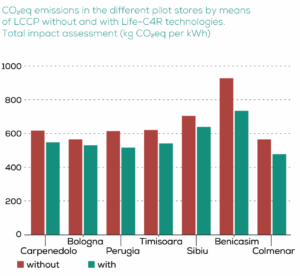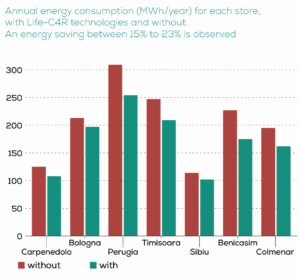Reducing greenhouse gas emissions is becoming increasingly immediate. It is a must in order tocombat the climate changes that threaten our survival and our future generations. This is a challenge that offers cold chain players important opportunities to promote the use of sustainable technologies that can combine reliability, safety and efficiency, whilst respecting the environment. Life-C4R project by Epta – multinational group specialising in commercial refrigeration – began in 2018. This project aims to accelerate the market deployment of a new generation of high-efficiency commercial refrigeration systems based on R744/CO2 refrigerant and suitable for any market and climatic condition. These solutions make it possible to completely eliminate old HFC chemical refrigerants which have caused great damage to our planet: F-gas emissions amount today to 2.5 % of the EU’s total GHG emissions. The project’s significance in terms of environmental, social, economic and technological progress has allowed it to be developed with co-financing from the European Union.
PROJECT GOALS
The project’s initial technical objective was to create a new generation of CO2 refrigeration systems. They would allow optimised performance and efficiency for any climatic situation and significant energy savings throughout the world and throughout the year. They would be possible by means of a unique technical and circuit solution, which is also extremely simple to use and maintain and therefore allows for unlimited dissemination.
The consequent environmental objectives are as follows:
- A drastic reduction of the system’s direct greenhouse emissions to near elimination of the same, thanks to the use of R744/CO2 refrigerant with GWP 1, therefore having a much lower level of emissions than traditional refrigerants. In addition, unlike synthetic refrigerants, CO2does not present any chemical risk to the environment as it is already present in the atmosphere.
- A significant improvement in the system’s efficiency, since it operates in low power mode all year round and guarantees the same energy savings in any weather condition. It therefore contributes to reducing the system’s indirect emissions and permits an ease of use that allows for very fast start-ups and low costs;
- A reduction of the overall environmental impact based on LCA analysis (according to the international LCCP standard) that certifies the lowest emissions during the system’s entire life cycle, from production to final disposal.
Ultimately, the Life-C4R project allows for the natural refrigeration systems’ quality standards to be raised even further. It promotes an acceleration in sustainability that is required now more than ever, including at the regulatory level.
STUDIES CARRIED OUT
In the three years of the project’s existence, numerous in-depth instrumental analyses were carried out on the seven pilot installations in Italy, Spain and Romania with the contribution of project partners Epta Iberia and DAAS. The results far exceeded expectations and demonstrated how Epta’s FTE 2.0 (Full Transcritical Efficiency) and ETE (Extreme Temperature Efficiency) systems make the use of CO2 refrigeration systems today reliable, safe and even more cost-effective.
Mechanically the FTE 2.0 system works with the same type of components as a standard CO2system. Its efficiency derives from a better use of evaporators for medium temperature users in “flooded” mode. ETE is instead a CO2 subcooling system designed to integrate FTE in high or extreme temperature conditions ensuring ideal performance and consumption even in hot climates and those with temperatures well above 40°.
The observation of the different systems installed was fundamental to prove FTE 2.0 and ETE’s performance, by varying the surface of the points of sale (from 1000 to 6000 m2), the climatic conditions (from mild to extremely hot temperatures) and the geographical position (different countries where habits, knowledge of the systems and skills differ).
THE RESULTS

The data produced by the systems during the 3 years of observation were processed as part of a precise consumption analysis, demonstrating that the Epta technologies used in the Life-C4R guarantee an annual decrease in energy consumption of between 15% and 23% (compared to traditional CO2 systems).
In addition, the LCA analysis of the entire life cycle of Life-C4R technologies greenhouse gas emissions according to LCCP (Life Cycle Climate Performance) standards, shows how the choice of Epta systems can reduce overall CO2 emissions by up to 20%.

“The value of the Life-C4R project for the future is very high. Not only have we eliminated the technological constraints of CO2, but thanks to the numerous outreach activities we have contributed to a cultural change, demonstrating how this refrigerant can be used everywhere in the world and how we can, today more than ever, accelerate towards climate neutrality in our activities. We are proud of the results of our project and of the hundreds of achievements all over the world. These systems are even installed in countries characterised by high temperatures, such as South America, Australia, UAE and South-East Asia, increasingly oriented towards solutions with almost zero environmental impact”, says Francesco Mastrapasqua, Epta’s Institutional Affairs Manager. “Sustainable systems such as those protagonists of the Life-C4R also offer the possibility of starting a structural retrofit programme of existing points of sale. The aim is to replace the old generation commercial refrigeration systems with modern technologies, thus aligning this sector with the objectives of European and global climate neutrality.”




